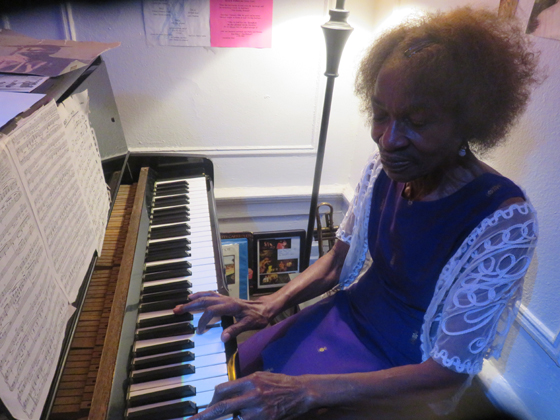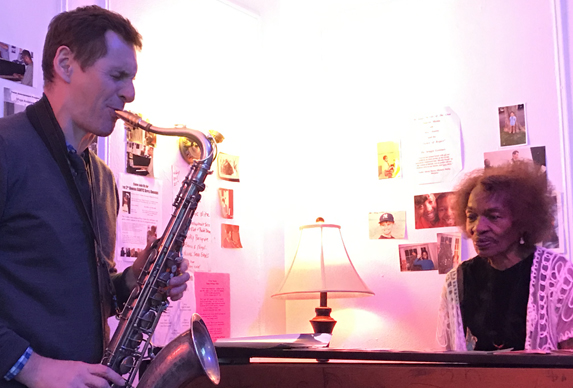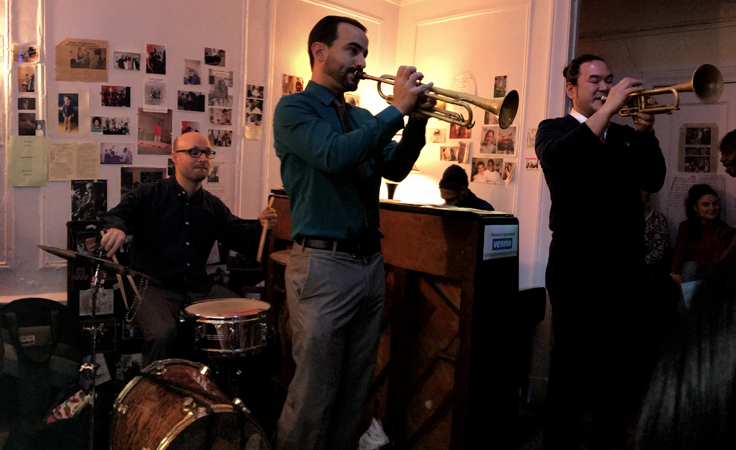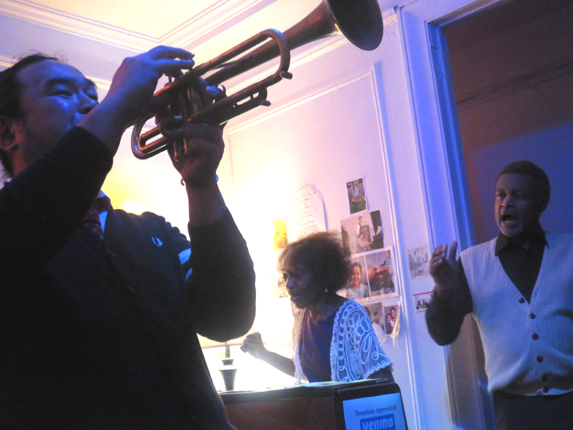MARJORIE ELIOT

Keeping the faith- NYC Parlor Entertainment Jazz
Article & photos by Jason Gross
New York jazz has long attracted visiting music-heads, leading them downtown to the Blue Note or Village Vanguard or to midtown for Birdland and the Iridium. For the more adventurous, a trip way uptown, to where the music once blossomed, leads to the third floor apartment of an octogenarian woman who's kept the music alive for decades. Marjorie Eliot keeps the faith with her jazz parlor, accommodating 50 people each Sunday in her home.
Eliot started in Georgia, playing piano before starting school and witnessed rehearsals of legendary performers like Sarah Vaughan, Billy Eckstine and Count Basie who swung through the area. Coming to Gotham in 1962, she immediately took in the music club scene. She also met drummer Al Drears who had worked with pianist Mal Waldron and Dizzy Gillespie and who would soon be her husband. Eliot performed at downtown clubs like the Duplex, playing standards like "Night and Day." Later that decade, she focused on her other passion of acting, appearing in the Pulitzer Prize winning No Place To Be Somebody (1969), a Broadway revival of The Member of the Wedding and an uncredited role in the 1973 Al Pacino crime-drama Serpico.
By the '80's, she taught drama workshops at the Hudson Valley Freedom Theater. She also found a new home in 1984 at 555 Edgecombe Avenue, on the northern edge of Harlem's famed Sugar Hill, where she still resides to this day at that National Historic Landmark building, which once housed Count Basie, Duke Ellington, Paul Robeson and other music legends.
Eliot used her space for readings and rehearsals but in 1992, her son Philip died and she honored him with music at a 1993 memorial concert across the street at the Morris-Jumel Mansion (the oldest house in Manhattan). Then she continued the tradition at her own home with jazz luminaries like Richard Wyands (piano), Bob Cunningham (bass), Jimmy Owens (trumpet) and another son of hers, Rudy Drears (piano, vocals). The repertoire ranged from '30's big band music and '40s jazz singer standards to bebop. She recalls now: "Sundays were always so sad. I would call friends. So instead of crying, we'd play music."

Sedric Choukroun duets with Marjorie
In a mostly pre-internet age, she spread the word with mailings and calendars about the shows and other music events she'd do at libraries, nursing homes and a Teamsters hall. Maintaining the parlor for decades now, Eliot sees it as dynamic: "It grows before your eyes. New things happen. It evolves into something. Each Sunday is another story. It changes every week. I learn a lot and the audience learns a lot."
After her son Michael died in 2007, Eliot had to deal with more family tragedy in the past decade as her husband died in 2011 and another son Alfred died in 2015. But the latter's passing created a turning point for the parlor- to honor Alfred's theatrical background, she incorporated readings into the shows. As she explains, "it's now music-theater. It all connects. The music is a character, it accompanies the monologue."
Incredibly, Eliot has kept her Sunday schedule of parlor shows going for 28 years, motivated by the crowds. "We're proud of the connection to the audience. They're very engaged, making up the prettiest part of the story. It's a sense of family and they're very supportive. And it chases the blues away."
Over the years, tourists from all over converged on Eliot's parlor. She's met people from Germany, England, Asia, Brazil, Costa Rica and across the States. "We're more alike than we are not in what we share. And they trust me and I trust them. The door is not locked on Sundays."
Sure enough, on a February afternoon, after making their way through the ornate lobby with a stained glass ceiling, the tourists filled the third floor hallway. On her front door, a plastic snowman with scarf was taped up just above the eyehole/peephole and a pink paper below it said "Happy Birthday Alfie" (honoring Eliot's son). Below the doorbell was a small lined paper with script writing, simply saying "Music 3:30" On the left side was a blue paper with a typed notice about the show:
"Celebrating Our American Songbook"
Sure enough, at 3:30PM, Eliot's door opened and as the crowd shuffled to the parlor's folding chairs and the hallways' benches (which take two hours to set up) as a preppy-dressed horn trio played "There Will Never Be Another You." The back-of-the-building apartment was dimly lit with scattered orange and pink lights. The walls were full of shows flyers on orange and pink paper, family photos, sheet music, Civil Rights clippings, a cardboard collage honoring her son Michael and a framed Coltrane portrait. Worn jazz albums by Gene Ammons, Betty Carter and Mal Waldron (which featured Eliot's late husband) were stacked around the wooden floors. A two hour set mostly of ballads picked up pace with "Sunny Side of the Street" and Charlie Parker's "Confirmation."
From behind an old upright piano in the corner lined with Christmas cards and a Venmo donation sign (@ParlorEntertainmentHarlem), Eliot wore a white lace dress, playing with her head down and eyes closed as if she was at a service. The audience sat quietly, listening as her friend Helga handed out fig bars and orange juice, later returning with a tip bucket. Readers/actors Eric Coleman and Arthur French came out to separately perform excerpts from Eliot's slave-themed play Afri-Ca Life On This Ameri-Can Soil: In the Quiet Night-Time of My Sleep-less Dream as the band quietly played "Go Down Moses" and "Amazing Grace" behind them. At the end, Eliot stood in front to graciously thank the crowd.

Will Glass (drums), Nicolas Mauro (trumpet), Rudy Drears (piano), Koichi Yoshihara (trumpet)
Next Sunday was notable for the presence of a BBC crew, a rhythm section (including drummer Wil Glass of the Jazz Foundation of America) and her son Rudy Drears. who led the band through dramatic takes on the gospel standard "I've Been in the Storm So Long," Ellington's "It Don't Mean A Thing" (done as a sing-along), "The Moon is Blue" (which he acted out sadly, sweetly), Charlie Parker's "Now's the Time" and Stevie Wonder's "Ribbon in the Sky." During the readings, we now heard "Battle Hymn of the Republic." At the end, the band roared through "This Little Light of Mine" (as another sing-along) with Eliot standing, singing and pumping her fist. Again, she thanked the crowd for "allowing her to grow and find creative expression." As the crowd dispersed, the band sent them out with "Take The A Train," which many of us did.
For a third Sunday, mainstay saxist Sedric Choukroun (who met his wife at the parlor) beautifully, sweetly dueted with Marjorie on "It's You or No One" (popularized by Sarah Vaughan) and "Love You Madly" (an Ella Fitzgerald standard). Rudy was an MVP again, doing a New Orleans piano romp on Monk's "Brilliant Corners" then tearfully singing "Swing Low Sweet Chariot" in honor of his late brother Alfie and minutes later launching a wonderfully comic take on Hoagy Carmichael's "I May Be Wrong."
Leaving the last show, I wondered what Majorie hoped that the audience took with them. She explained "I hope they know I'm grateful to them and thank everyone who's crossed the threshold. Whether they liked it or not, thank you."

Koichi Yoshihara (trumpet), Marjorie Eliot (piano), Eric Coleman (vocals)
And not even the dreaded Coronavirus can stop Eliot from sharing her music. As of now, you can see her Sunday parlor shows from the Parlor Entertainment Facebook page. And why wouldn't you want to be part of jazz history from the comfort of your own home?